What you need to know:
- The relevance of data science extends beyond far tech companies.
You have probably not heard much about it but no discipline currently holds more promise or power than data science and analytics.
Data science is an interdisciplinary field that uses scientific methods, processes, algorithms, and systems to examine large amounts of data in order to uncover hidden patterns, generate insights, and guide decisions. It is the backbone of modern innovation, the foundation of artificial intelligence, and the brain behind most technologies that shape our lives today.
From predicting consumer behaviour to improving healthcare outcomes, optimising business decisions, improving governance, and even detecting fraud before it happens, data science has proven indispensable. What sets it apart is its cross-cutting relevance. It blends mathematics, statistics, programming and domain-specific knowledge to derive meaning from raw data.
Whether it is Google predicting what you’ll type next, Netflix recommending your next series, or epidemiologists forecasting the spread of disease, data science is the force behind the scenes. Crucially, data science powers machine learning and Artificial Intelligence (AI), technologies that have currently reshaped everything tech. But AI doesn’t work in a vacuum.
It’s data science that feeds, trains and continually improves it. The recent explosion of AI, seen in tools like ChatGPT, self-driving cars and facial recognition systems has brought data science from a niche technical field into everyday conversation. One reason data science earns its badge as the career of the century is because of how urgently and universally it is needed. The world is generating more data than ever. Every second, approximately 6,000 tweets are posted, over 100,000 Google searches are made, and millions of data points are generated by smartphones, sensors, satellites and digital transactions.
Without skilled professionals to interpret it, this data remains meaningless — unstructured, unused, and ultimately unproductive. Enter the data scientist.
These professionals collect, clean, organise, analyse and make models to extract insights and generate predictions. They train machine learning models, evaluate bias and develop algorithms that can diagnose disease, recommend content or flag suspicious transactions in real time. They are also storytellers who sift through the noise to find patterns, identify trends and transform data into actionable intelligence that gives organisations a competitive edge and helps solve complex societal problems, say fighting terrorism and efficient resource allocation in national budgets.
The relevance of data science extends beyond far tech companies. In agriculture, AI powered drones and predictive models help increase yields. In education, data analytics is helping personalise learning. In climate science, machine learning is used to predict extreme weather events and track emissions.
In finance, it improves risk management and fraud detection. I could go on. Every industry is turning to data to stay competitive, and data science is the key to unlocking that potential. Governments and educational institutions worldwide have recognised this demand. Universities now offer specialised undergraduate and postgraduate programmes in data science and AI. Online platforms like Coursera, edX and Udemy are making it easier for students and mid-career professionals to re-skill. According to LinkedIn, data science has been one of the fastest-growing jobs globally for the past several years, and the demand far exceeds supply.
Employers value practical skills over traditional credentials. Those proficient in programming languages like Python, R and even simple ones like SQL, data visualisation tools like Microsoft Excel, Tableau, Power BI and machine learning frameworks are finding lucrative opportunities everywhere. Beyond the job market, data science shapes the ethical and political landscape.
How data is used, or misused, can influence elections, determine surveillance policies, and social equity. As such, today’s data scientist must not only be technically skilled but also ethically alert. The field is evolving to emphasise not just how to analyse data, but how to do so responsibly. Critically, the democratisation of data science means it is no longer just for mathematicians and software engineers.
Journalists, policy makers, business managers, and even artists are now using data to inform their work. Fluency in data is becoming as essential as literacy itself since everything is increasingly relying on numbers. For students and professionals contemplating what to study or pivot into, a clear choice is here. Data science and analytics are not just tools, they are transformational lenses through which the world is understood and shaped. In terms of opportunity, impact, and relevance, few fields come close. This is not a fleeting trend; it is the foundation of the future. And that’s why it could be, without exaggeration, the career of the century.
Simon P Bbaale,
Provided by SyndiGate Media Inc. (
Syndigate.info
).







